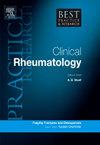Reframing health disparities in SLE: A critical reassessment of racial and ethnic differences in lupus disease outcomes
IF 4.5
2区 医学
Q1 RHEUMATOLOGY
Best Practice & Research in Clinical Rheumatology
Pub Date : 2023-12-01
DOI:10.1016/j.berh.2023.101894
引用次数: 0
Abstract
Health disparities in the prevalence and outcomes of systemic lupus erythematosus (SLE) are well documented across racial and ethnic groups. Similar to other chronic diseases, differences in disease severity among individuals with SLE are likely influenced by both genetic predisposition and multiple social determinants of health. However, research in SLE that jointly examines the genetic and environmental contributions to the disease course is limited, resulting in an incomplete understanding of the biologic and social mechanisms that underly health disparities. While research on health disparities can reveal inequalities and inform resource allocation to improve outcomes, research that relies on racial and ethnic categories to describe diverse groups of people can pose challenges. Additionally, results from research comparing outcomes across socially constructed groups without considering other contributing factors can be misleading. We herein comprehensively examine existing literature on health disparities in SLE, including both clinical studies that examine the relationship between self-reported race and ethnicity and disease outcomes and studies that explore the relationships between genomics and lupus outcomes. Having surveyed this body of research, we propose a framework for research examining health disparities in SLE, including ways to mitigate bias in future studies.
重新定义SLE的健康差异:对狼疮疾病结局的种族和民族差异的重要重新评估
系统性红斑狼疮(SLE)的患病率和预后的健康差异在种族和民族群体中都有很好的记录。与其他慢性疾病类似,SLE患者之间疾病严重程度的差异可能受到遗传易感性和多种健康社会决定因素的影响。然而,联合检查遗传和环境因素对SLE病程的影响的研究是有限的,导致对健康差异背后的生物和社会机制的理解不完全。虽然对健康差异的研究可以揭示不平等现象,并为资源分配提供信息,以改善结果,但依靠种族和族裔类别来描述不同人群的研究可能会带来挑战。此外,在不考虑其他影响因素的情况下比较社会建构群体的结果的研究结果可能会产生误导。在此,我们全面检查了现有关于SLE健康差异的文献,包括检查自我报告的种族和民族与疾病结局之间关系的临床研究,以及探索基因组学与狼疮结局之间关系的研究。在调查了这些研究之后,我们提出了一个研究SLE健康差异的框架,包括在未来研究中减轻偏倚的方法。
本文章由计算机程序翻译,如有差异,请以英文原文为准。
求助全文
约1分钟内获得全文
求助全文
来源期刊
CiteScore
9.40
自引率
0.00%
发文量
43
审稿时长
27 days
期刊介绍:
Evidence-based updates of best clinical practice across the spectrum of musculoskeletal conditions.
Best Practice & Research: Clinical Rheumatology keeps the clinician or trainee informed of the latest developments and current recommended practice in the rapidly advancing fields of musculoskeletal conditions and science.
The series provides a continuous update of current clinical practice. It is a topical serial publication that covers the spectrum of musculoskeletal conditions in a 4-year cycle. Each topic-based issue contains around 200 pages of practical, evidence-based review articles, which integrate the results from the latest original research with current clinical practice and thinking to provide a continuous update.
Each issue follows a problem-orientated approach that focuses on the key questions to be addressed, clearly defining what is known and not known. The review articles seek to address the clinical issues of diagnosis, treatment and patient management. Management is described in practical terms so that it can be applied to the individual patient. The serial is aimed at the physician in both practice and training.

 求助内容:
求助内容: 应助结果提醒方式:
应助结果提醒方式:


